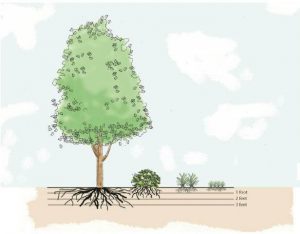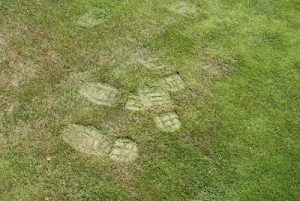Well, unlike many states up north, Florida winters are particularly bearable. In fact, we happen to attract many tourists from November to March, our annual “snowbird” season. Who can blame someone for wanting to escape the blistering cold and snow? I sure can’t. The comparatively mild Florida temperatures also allow most of our plants to survive throughout the year given proper care and attention. One way to help care for our plants and the planet is to skip a week of irrigation in the winter.
Skip-A-Week for Stronger Plants
In the winter, plants need less water than they do in the summer. That is because evapotranspiration rates are much lower in cooler weather. Since plants need less water in the winter, it can be a great time to encourage healthy root growth.

When you irrigate your yard, that water does not get immediately used. Instead, it trickles down through the soil and eventually enters the plant’s root zone, or the space in the soil where roots are present. The size of the root zone can be different depending on the plant type. For instance, grass has a much smaller root zone than trees. Once the water reaches the root zone, it will be absorbed by the roots and travel through plant tissue known as xylem to the rest of the plant. When water is not as readily available, plants spend some of their energy growing longer roots. This increases their access to water and minerals in the soil. Plants with long, healthy roots will use less water, be more drought-tolerant, and have better soil stability…and the best part? You get to do less work and use less water to help make that happen.
The process is simple. Research from the University of Florida suggests that turfgrass only needs 1/2 to 3/4 of an inch of water every 10 to 14 days in the winter months. Additionally, most Florida natives and naturalized plants can withstand the drier weather and do not need supplemental watering throughout most of the year. That means that you can skip a week (or two) of irrigation in the winter to help cut down on your water consumption and increase your plants’ resilience.
When to Water

There are a few telltale signs to look for in thirsty plants. A good way to check if your grass needs water is to do a “footprint” test. If you step onto your turf, and it leaves a footprint, it means it’s time to irrigate. Other ways to check if your turfgrass is water-deficient include looking for folded grass blades and a blue-grey color.
Remember to follow watering restrictions and only water during the allotted time and day for your municipality. You can check out our county’s watering restrictions here.
Help Make a BIG Difference
If everyone were to skip just one week of irrigation this winter, we would all save a collective 1.9 billion gallons of water. That is enough water to irrigate just under 60,000 Florida yards for an entire year. To learn more about the Skip-A-Week initiative, watch the video below and visit the Southwest Florida Water Management District’s website.
An Equal Opportunity Institution. UF/IFAS Extension, University of Florida, Institute of Food and Agricultural Sciences, Nick T. Place, dean for UF/IFAS Extension. Sarasota County prohibits discrimination in all services, programs or activities. View the complete policy at www.scgov.net/ADA.
 2
2
